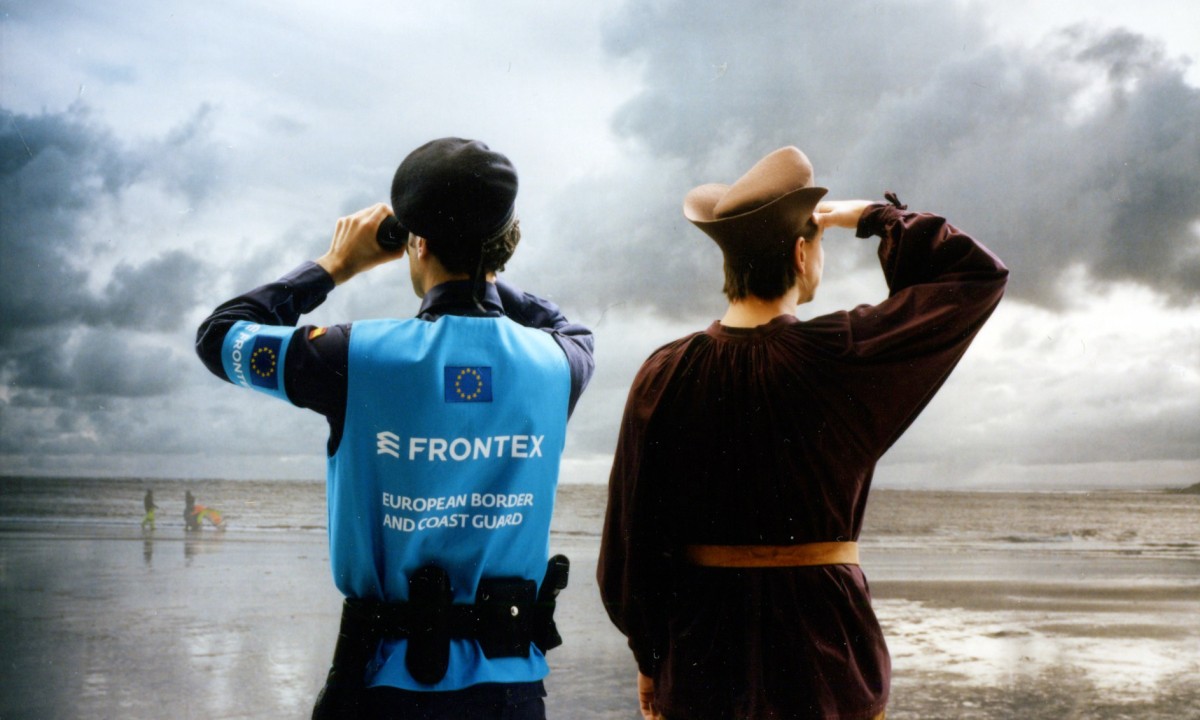29. July 2024
Expo Window
There be Dragons
by Lisl Ponger & Daniela Pscheiden
Photographic work: Lisl Ponger
Text: Daniela Pscheiden
Unexplored areas on medieval maps were shown to be populated with dragons, leviathans, and sea monsters. European voyages of discovery soon changed this perception. In this installation, Europe is represented by the seafarer Christopher Columbus (c. 1451–1506) and a Frontex official peering out to sea. The former set out into the unknown to enlarge the known world, while the latter forms a bulwark against undesired refugees from the “outside” world.
Columbus’s voyage was mainly a commercial enterprise. In search of a direct sea passage to India to avoid the tedious circumnavigation of the Cape of Good Hope, in 1492 he “discovered” islands off the coast of the American continent. Although Columbus believed throughout his life that he had voyaged to the west coast of India, his “discovery” resulted in the permanent colonization of America by Europeans. Apart from the devastating effect of the illnesses they introduced, the Spaniards arriving in the wake of Columbus committed atrocities against the indigenous population. Spain was interested in economic hegemony and the search for gold, but also the conversion of the original inhabitants to Catholicism. Centuries of European influence and domination of the American continent were to follow.
Frontex was founded in 2004 by the European Union as the European Border and Coastguard Agency to protect the external borders of the Schengen region. It was given further competences in 2015 as a reaction to the “refugee crisis.” A coastguard service was established, and a standing corps of 1,500 persons was set up as the EU’s first uniformed law enforcement service. It was also allowed to acquired vehicles and equipment independently. Even then, there were those who claimed that the so-called “refugee crisis” was in fact a “migration management crisis” and feared that the new powers would put the EU’s human rights standards at risk. The agency’s competences were further enlarged in 2019 with an increase in the standing corps to 10,000 members by 2027 and an augmentation of the annual budget from 460 to 900 million euros.
In 2020, journalists reported serious human rights violations, including illegal pushbacks and arbitrary abandonment on the high seas. Illegal pushbacks refer to the forcible return to the open seas of refugees who have already reached European sovereign territory. Frontex executive director Fabrice Leggeri resigned in 2022 when it was revealed that the Frontex management had covered up pushbacks of this nature by Greek officials. In May 2024, two NGOs in Paris initiated legal proceedings against him. A month later, Leggeri stood as a candidate in the European elections for Marine Le Pen’s right-wing population Rassemblement National party, claiming that the EU Commission wanted to transform Frontex into some kind of reception committee for refugees.
According to a judgment by the European Center for Constitutional and Human Rights, refugee and human rights are valid on the high seas, in other words outside the twelve-mile zone. Refugees apprehended at sea can thus apply for asylum. In violation of this decision, Frontex works with the coastguards of North African states, who transport refugees to camps in remote desert regions.
There have been numerous reports of disregard for legal regulations. Boats are forced to turn around close to the European coast, although the refugees are suffering from dire shortages of water and food. There have also been cases of boats being fired at to force them to turn round or pushed back to countries where refugees are at risk of torture or the death penalty.
In other words, while “we” are entitled to protect ourselves against “outsiders,” their homelands should be open for tourism, economic interests, and political interventions—and we should be allowed to safeguard our wellbeing without any regard for morality and human rights. The installation thus gives food for thought: Who are the monsters today?
Lisl Ponger
There be Dragons, 2019
Digital print, Light box
Courtesy of the artist

